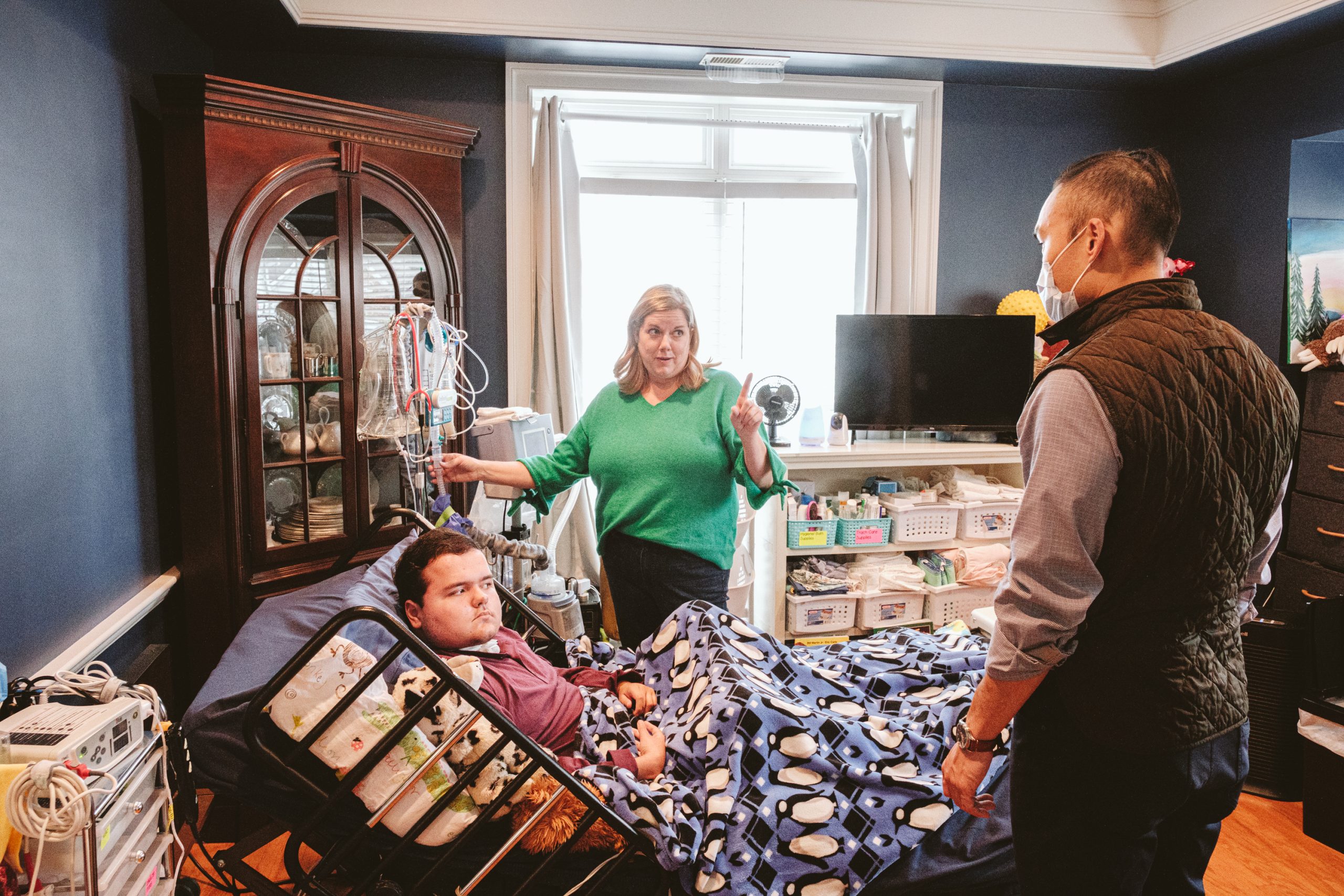Dee Dee Hallock moved to Charlottesville from Florida after her son Nicholas fell ill. He began having issues walking in the fall of 2019. Within six weeks, he was fully in a wheelchair. In January 2020, his oxygen levels dropped and he needed to be admitted to the ICU for two months. That’s when he was diagnosed with an ultra-rare metabolic disorder. Soon he needed a tracheostomy to breathe and a feeding tube to eat.
For a single mother of triplets, this was challenging enough. But since arriving in Virginia, Hallock has had to contend with a new obstacle: limited supplies from the durable medical equipment companies that provide the tubes and ventilators Nicholas needs to live at home.
“I’m only one of many thousands of parents in the state of Virginia who this affects,” says Hallock. “It’s my child’s health, it’s his quality of life.”
An elementary school teacher, Hallock is no longer able to work because Nicholas requires 24-hour care and she has been unable to find a full-time home nurse. She gets her groceries delivered to avoid going out to the store. Getting basic equipment for her son is a challenge, as things like ventilator parts can be delayed for months at a time.
Virginia’s DME companies face multiple problems stemming from the coronavirus pandemic, including supply chain disruptions, backorders, silicon shortages, and inflation. These factors alone have made getting supplies like new feeding tubes difficult for families, but the current Medicaid reimbursement rate has also affected the companies’ ability to attract qualified staff and dispense supplies without operating at a loss. Now, a new budget amendment under consideration in the General Assembly could address the low reimbursement rates that haven’t been able to cover rising costs.
Transitioning a medically fragile child from the hospital to home is expensive, requiring both specialized equipment and expert maintenance. As the ventilator program lead at UVA Children’s Hospital, Michael O’Brien takes care of children who need surgically placed airways in their neck and a machine that breathes for them, and he knows what it costs for parents to take on the task themselves.
“Just in terms of dollars and cents, all of the supplies required for not just the breathing equipment but also the feeding supplies and the actual nutrition is a lot,” says O’Brien. “A monthly bill can range between $10,000 and $12,000 billed to the patient’s insurance.”
While each patient’s insurance covers those exorbitant costs, the actual price of materials and shipping results in the equipment becoming more and more expensive to manufacture. With reimbursement for home health companies unable to meet the changing costs, companies can only supply what keeps them in the black. Parents then have to ration.
“These [supplies] are things that get dirty, because these are things that are always in contact with a patient,” says O’Brien. “And for infection control reasons, we have schedules for routine changing of equipment. My families cannot change those equipment as regularly as we instruct them to because they don’t have the supplies.”
Some families don’t receive the little supplies they’ve been allocated per month, leaving them to buy supplies online.

“These surgical airway tubes, these tracheostomy tubes … you might have been able to find one for $50 before the pandemic,” says O’Brien. But if costs rise, there often is no alternative, because only one manufacturer might make a part. “Right now, these surgical airways might be $100, or in some cases several hundred dollars.”
“My institution does not think that changing one tube a month is safe for patients,” he says, which is why they haven’t changed their policy to reflect the supply. “That would be backwards, anyways, letting medical supplies dictate how you practice medicine.”
Last summer, Laura McGrath and her son struggled to get any supplies.
“We went for three months without getting a delivery of food for my son,” says McGrath. “We went for three months without getting the number of tracheostomy tubes that had been ordered for him. They were sending us one a month and saying, ‘Boil it in some water and reuse it.’”
McGrath’s son Finn was diagnosed with cerebral palsy, and requires total care at home. He uses a feeding tube because he has difficulty swallowing, and uses a tracheostomy tube, too, due to neuromuscular issues.
For his meals, Finn receives a pack of food with pre-measured amounts of protein, fat, and carbohydrates. Many children need specific formulas like this.
“When your child has a feeding tube, you kind of go through a formula trial,” says McGrath. “It’s very torturous for both the child and the parent because until you find the medical food that works for your child, your child is going through this period of time, sometimes for months, where they’re gagging and retching and vomiting and not tolerating their food at all, and so they’re not getting fed. It’s extremely stressful.”
When the supply companies can’t provide the right formula, parents have to go through that same difficult process with a substitute. Some parents have resorted to diluting condensed milk as an alternative.
McGrath, like Hallock, is hoping the new budget amendment will defray costs for DME companies and make it easier for parents to care for their children at home. Patroned by Del. Emily Brewer in the House and Sen. Siobhan Dunnavant in the Senate (both Republicans), the amendment would set the reimbursement rate for durable medical equipment to 100 percent of the Medicare rural rate, using $9 million from the general fund and nearly $12 million from non-general funds to support the initiative.
In a statement to CBS 6, Dunnavant said, “Families have not been able to get coverage of items that are necessary to care for their children in the home. … Virginia has made a commitment that the home is the best, most enriching place for children with these extraordinary needs and now we need to be sure they can get the tools they need for care so they can stay at home.”
For Marc Castelo, national director of sales and marketing, HME for Thrive Skilled Pediatric Care, the situation is dire. Thrive transitions medically fragile children home with life-sustaining equipment and services like nursing and physical and speech therapy. He sees the amendment as the only solution that will save his company from pulling out of the commonwealth.
“In Virginia, we are the last pediatric home care company left standing,” says Castelo. “The reason we’re the only ones in the market is that the margins have just become so thin that it’s very difficult to operate.”
Castelo says that even hiring respiratory therapists for the home health care environment has been hard, because RTs get paid more in the hospital. Since it can’t pay a competitive rate, Thrive struggles to attract staff in the state. “Our reimbursement for respiratory therapists is zero,” he says. “There is no reimbursement. So that has to be built into our margin, so that’s another cost.”
“It’s a ticking time bomb waiting to go off.”
On February 25, the General Assembly adjourned without reaching an agreement on the state budget. Republicans and Democrats are in a deadlock, leaving amendments like this one hanging in the balance.





